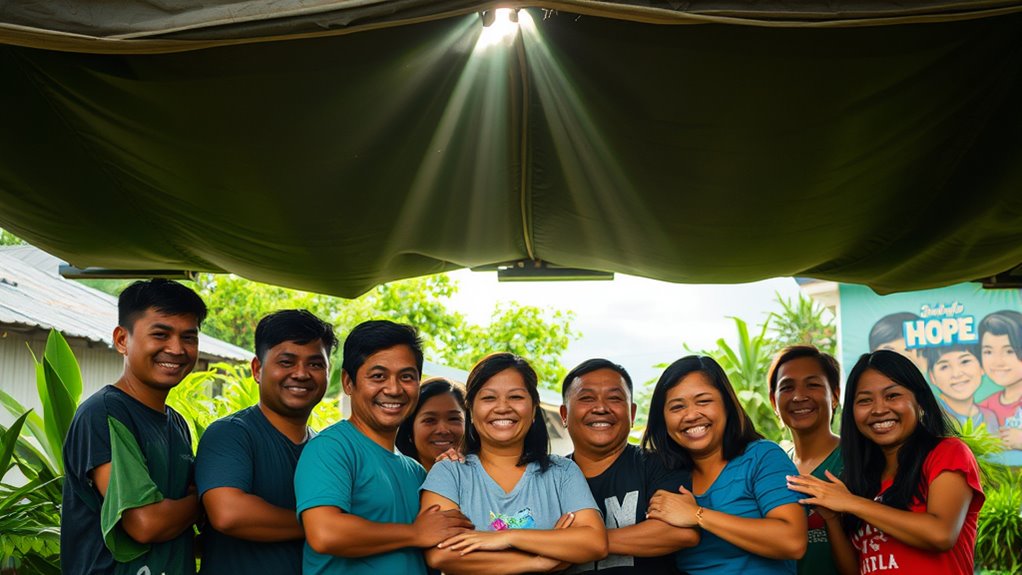Filipino resilience strengthens relationships by emphasizing family support, sacrificial love, and strong cultural values. You’ll find that a tight-knit family structure fosters loyalty and emotional backing during tough times. Shared values, such as empathy and community cohesion, enhance bonds and provide a sense of belonging. This unique blend of spirituality and historical strength instills adaptability and unity. As you explore this further, you’ll uncover how these elements shape the Filipino experience in relationships.
Key Takeaways
- Filipino resilience fosters strong family cohesion, providing emotional and mental support during challenging times.
- Sacrificial love and selfless acts reinforce loyalty and deepen connections within families and communities.
- Community cohesion and social support networks enhance belonging, aiding individuals in navigating personal struggles.
- Spirituality strengthens bonds through shared values and experiences, promoting harmony and ethical behavior.
- Positive relationship dynamics are cultivated through open communication, trust-building, and focusing on strengths, enhancing overall marital satisfaction.
The Role of Family as a Support System

While you may encounter various support systems in your life, the family remains the cornerstone for many Filipinos. High family cohesion fosters loyalty, often providing the mental and emotional support you need during tough times. Your family serves as your primary source of advice and assistance, reflecting a cultural emphasis on kinship.
Children, viewed as investments, carry hopes for future success and economic support. However, challenges like financial constraints can strain this well-being. Despite these hurdles, the resilience of Filipino families shines through as they navigate adversity together, reinforcing bonds that help you cope with life’s complexities.
This strong family foundation is essential for fostering stability and nurturing personal growth in a culturally rich context.
Sacrificial Love: A Pillar of Resilience

Sacrificial love stands as a foundational pillar of resilience in Filipino culture, reflecting a deep commitment to family and community. It manifests through selfless acts of service, especially during tough times.
You see this in Overseas Filipino Workers (OFWs) who leave their loved ones behind to secure a better future. Communities support these families, showcasing collective strength.
Acts like sharing food symbolize care, while providing economic support highlights dedication. Caring for elders further emphasizes respect and love.
Such sacrifices build resilience, creating strong bonds that help families cope with adversity. By prioritizing the well-being of others, you foster a sense of belonging and security, reinforcing relationships that withstand challenges.
Sacrificial love truly enriches the Filipino spirit.
Shared Values That Foster Strong Relationships
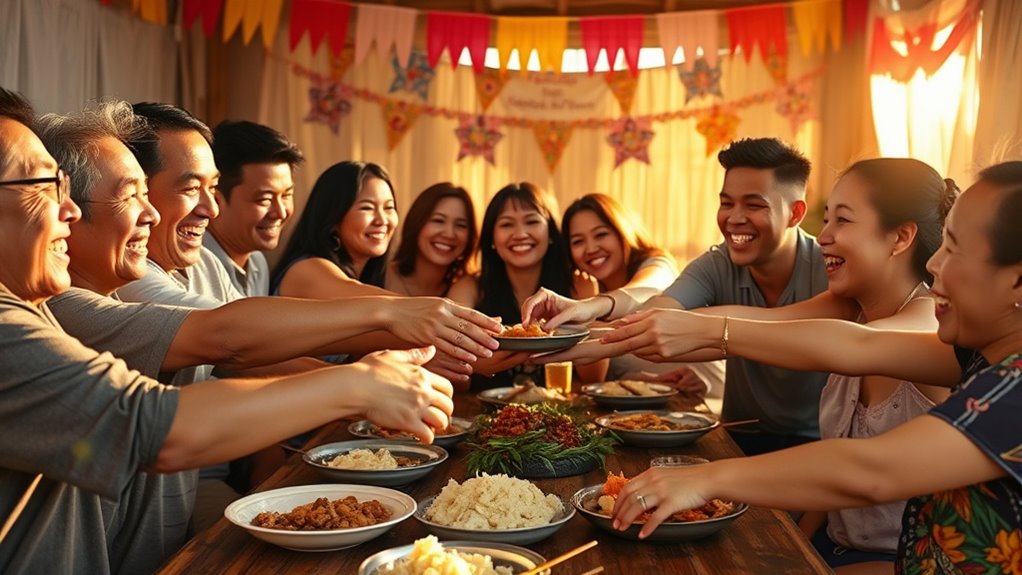
In Filipino culture, shared values play an essential role in building strong relationships, as they foster a sense of unity and belonging among individuals.
You’ll notice that respect for elders strengthens intergenerational bonds, while the concept of pakikisama emphasizes group harmony, encouraging consensus over personal desires. Navigating these relationships can be particularly challenging when emotional instability is present, as seen in cases of Borderline Personality Disorder.
Loyalty, rooted in utang na loob, promotes reciprocity and unwavering support.
Spiritual beliefs guide your interactions, often prioritizing family ties above all else. This is especially important during conflicts, as effective communication strategies can help manage misunderstandings caused by heightened emotional responses.
Emotional closeness is important; the need for acceptance drives mutual support and protective behaviors.
As you navigate relationships, you’ll find that empathy and compassion are critical for maintaining harmony. These shared values create a strong foundation, enabling you to face challenges together and deepen your connections. Additionally, the importance of emotional expressions of love can significantly enhance your relationships by fostering deeper connections and understanding among family members.
Community Cohesion and Collective Efforts
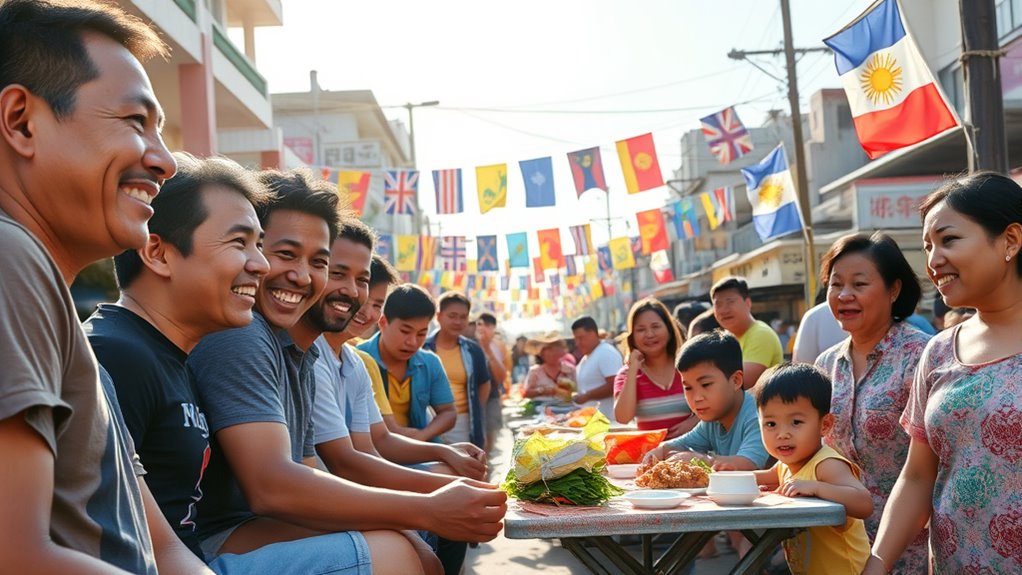
Building on the strong foundation of shared values in Filipino culture, community cohesion and collective efforts play an important role in enhancing relationships among individuals.
You’ll find that social support networks provide essential emotional comfort during crises, allowing you to lean on neighbors and friends. Strong kinship and friendship ties foster a sense of belonging, vital for collective well-being. The importance of open communication about feelings within these networks also helps individuals navigate personal struggles effectively, as it encourages strong communication skills that enhance relationships. In times of adversity, communities often demonstrate remarkable resilience during disasters, showcasing their ability to unite and support one another. Moreover, creating supportive living spaces for seniors can further strengthen these communal ties and enhance the overall quality of life. Additionally, effective co-parenting plans can contribute to the emotional stability of children, fostering a sense of security within the community.
When natural disasters strike, you witness how communities unite, sharing resources to rebuild and cope together. Engaging in community activities strengthens these bonds, making it easier to tackle economic challenges and support mental health.
The Impact of Cultural Norms on Relationships
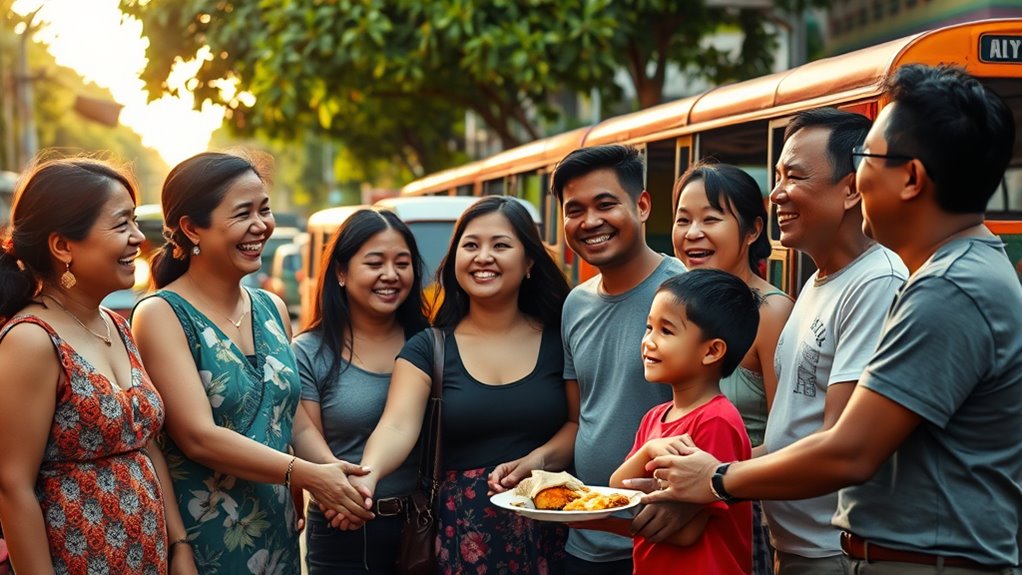
While cultural norms shape many aspects of life, their impact on relationships in Filipino society is particularly profound. Family values play an essential role, emphasizing unity and support in your connections. You’ll often find that decisions, especially regarding marriage, involve family input, reinforcing those strong ties. Traditional courtship practices, such as gift-giving and singing romantic songs, highlight the importance of respect not just towards your partner but also their family. Additionally, understanding postpartum sexual activity can help couples navigate intimacy after starting a family, ensuring both partners feel supported during this transition. Family support systems can also provide invaluable resources and assistance to couples as they adjust to new dynamics. This support is vital, as the dad and daughter bond often influences parental roles and expectations in Filipino families. Furthermore, the emotional turmoil caused by narcissistic abuse can significantly affect relationship dynamics, making it essential to prioritize mental health and open communication.
In today’s world, technology offers new ways to connect, yet maintaining respect and traditional values remains critical. Balancing these elements fosters commitment and resilience, ensuring that even in challenging times, you have a strong foundation through family support and cultural norms. Additionally, understanding the importance of family support can further enhance these relationships by providing emotional stability and guidance.
Resilience Among Filipino Americans

Resilience among Filipino Americans stems from a rich tapestry of cultural identity and family influence. Your strong connection to cultural roots boosts your self-esteem and sense of belonging.
You’ve likely witnessed how Filipinos thrive despite adversity, showcasing endurance that’s ingrained in your community. Family plays a vital role, often prioritizing collective needs over individual desires, which strengthens your resilience. Continuous learning is a key aspect that aids in navigating life’s challenges effectively, and unconditional love within families serves as a foundation for this resilience.
Filipinos exemplify resilience through collective strength, with family support prioritizing unity over individuality in times of adversity.
Optimism and flexibility help you adapt to challenges, while community support offers additional strength during tough times. These cultural values shape your ability to cope with acculturative stress and mental health challenges, fostering a protective shield against difficulties. Additionally, embracing self-care routines can significantly enhance your resilience and overall well-being.
Ultimately, your resilience not only enriches your life but also reinforces the bonds within your family and community.
Psychological Resources and Relationship Strength
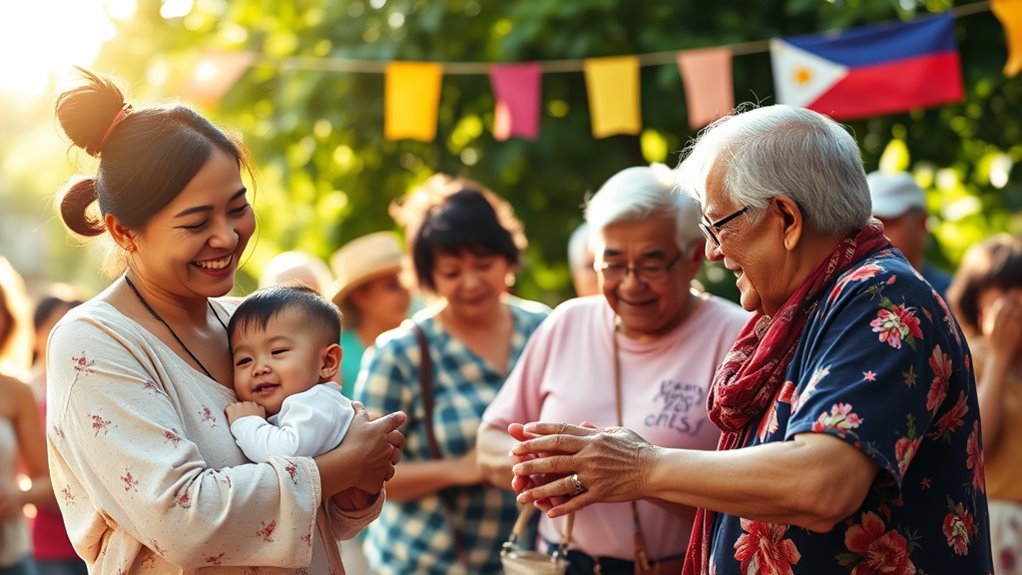
Psychological resources play an essential role in strengthening relationships, as they empower individuals to navigate challenges more effectively. Traits like optimism and a sense of mastery foster a supportive environment, enhancing marital satisfaction. Additionally, developing secure attachment can significantly contribute to the emotional safety needed for deep connections. Research indicates that children of unfaithful parents often experience emotional distress, which underscores the importance of building healthy relationship foundations. Furthermore, having a trusted companion during significant life transitions can greatly enhance the support available to couples.
When you maintain a positive outlook, it helps you and your partner keep a healthy perspective during tough times. Supportive behaviors act as a bridge between these psychological resources and increased satisfaction, allowing both partners to feel valued. Moreover, frequent no-shows in relationships can highlight the need for open communication, contributing to a more resilient partnership.
Focusing on each other’s strengths instead of weaknesses can also improve your relationship. By promoting personal assets, you contribute positively to your emotional well-being, strengthening bonds and resilience. Furthermore, trust-building activities can significantly enhance your relationship dynamics, encouraging collaboration and mutual support.
Ultimately, leveraging these psychological resources can lead to deeper connections and a more fulfilling partnership.
Spirituality and Its Influence on Connections

Building on the strong foundation of psychological resources, spirituality greatly influences how connections are formed and maintained in Filipino culture. Your faith often strengthens bonds, providing a sense of community crucial for nurturing relationships. Engaging in spiritual practices not only enhances emotional support but also fosters understanding among family members. These practices promote harmony, guided by values like “Makadiyos at Makatao,” and offer moral guidance that encourages ethical behavior. Additionally, many families incorporate low light office plants into their homes, creating a serene environment that enhances spiritual practices and emotional well-being.
Spirituality helps you adapt to challenges, ensuring relationship stability during tough times. Additionally, shared spiritual experiences create deeper connections, reinforcing social cohesion and resilience. Furthermore, the teachings of Jesus emphasize love and compassion, reinforcing the importance of nurturing relationships in our lives.
Historical Context and Its Effect on Resilience
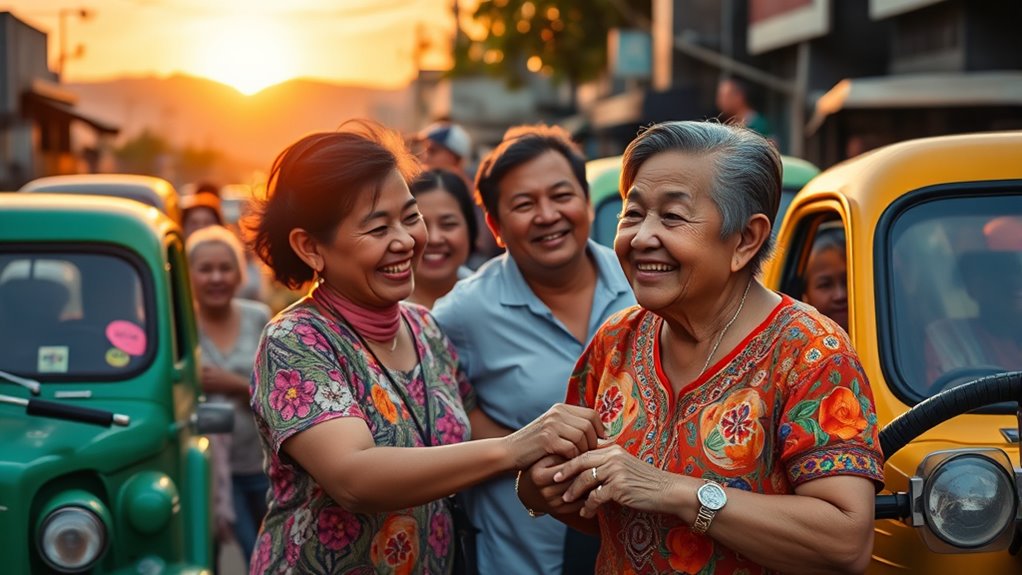
Although the Philippines has faced numerous historical challenges, these experiences have profoundly shaped the resilience inherent in Filipino culture. The country’s colonial history under Spain, the U.S., and Japan instilled a strong sense of adaptability and sovereignty in Filipinos.
Despite these hardships, families became central units, emphasizing love and support that foster individual resilience. This cultural foundation is evident in the spirit of “Bayanihan,” where communities unite during crises, strengthening relationships.
Frequent natural disasters, like Super Typhoon Haiyan, further test this resilience, showcasing how Filipinos rally together. Economic struggles also contribute, with family networks providing crucial support.
Ultimately, these historical contexts cultivate values of optimism and flexibility, essential for steering through life’s challenges and reinforcing bonds within the community.
Frequently Asked Questions
How Does Resilience Affect Communication Within Filipino Families?
Resilience greatly affects communication within Filipino families by fostering adaptability and support during challenges.
When you encounter difficulties, you rely on strong family ties to navigate issues together. This collective strength encourages open dialogue, allowing you to express feelings and concerns more freely.
What Role Does Humor Play in Filipino Resilience?
Humor plays an essential role in Filipino resilience by helping you navigate tough situations with a lighter heart.
When faced with adversity, you often turn to laughter, finding solace and strength in shared jokes and funny stories.
This ability to see the humorous side of life not only eases stress but also fosters a sense of community, allowing you to connect with others and bounce back more effectively from challenges.
How Do Resilience Strategies Differ Among Generations?
Resilience strategies differ among generations mainly due to changing values and societal influences.
You might notice that older generations rely on traditional coping mechanisms, emphasizing patience and close family ties.
In contrast, younger Filipinos often embrace open communication and modern values, blending traditional and contemporary strategies.
They actively address adversity instead of ignoring it and prioritize individual rights, reflecting a shift in how resilience is perceived and practiced within families and communities.
Can Resilience Improve Romantic Relationships in Filipino Culture?
You might find that resilience can be a gentle balm for romantic relationships, especially within Filipino culture.
Embracing challenges together, you and your partner can cultivate a deeper bond. When life throws curveballs, your shared strength and adaptability help you navigate storms, making your connection stronger.
As you prioritize each other’s emotional well-being, the love you share flourishes, turning trials into opportunities for growth, ultimately enriching your relationship’s tapestry.
How Is Resilience Taught to Children in Filipino Families?
In Filipino families, resilience is taught through everyday experiences and cultural values.
You learn the importance of burden-sharing and adaptability from your parents and community. They encourage open communication and problem-solving, especially during tough times.
Participating in community programs and educational initiatives helps you develop social-emotional skills.
Through these interactions, you gain a strong foundation in resilience, preparing you to face life’s challenges with strength and optimism.
Conclusion
In the Philippines, a staggering 93% of families say they rely on each other during tough times, showcasing the profound strength of familial bonds. This resilience not only strengthens individual relationships but also weaves a tapestry of support throughout communities. When you embrace these values, you’re not just building connections; you’re fostering a network of love and support that can weather any storm. It’s this spirit that truly defines Filipino relationships and uplifts everyone involved.
